The AMD 2nd Gen Ryzen Deep Dive: The 2700X, 2700, 2600X, and 2600 Tested
by Ian Cutress on April 19, 2018 9:00 AM ESTCPU Legacy Tests
Our legacy tests represent benchmarks that were once at the height of their time. Some of these are industry standard synthetics, and we have data going back over 10 years. All of the data here has been rerun on Windows 10, and we plan to go back several generations of components to see how performance has evolved.
All of our benchmark results can also be found in our benchmark engine, Bench.
3D Particle Movement v1
3DPM is a self-penned benchmark, taking basic 3D movement algorithms used in Brownian Motion simulations and testing them for speed. High floating point performance, MHz and IPC wins in the single thread version, whereas the multithread version has to handle the threads and loves more cores. This is the original version, written in the style of a typical non-computer science student coding up an algorithm for their theoretical problem, and comes without any non-obvious optimizations not already performed by the compiler, such as false sharing.
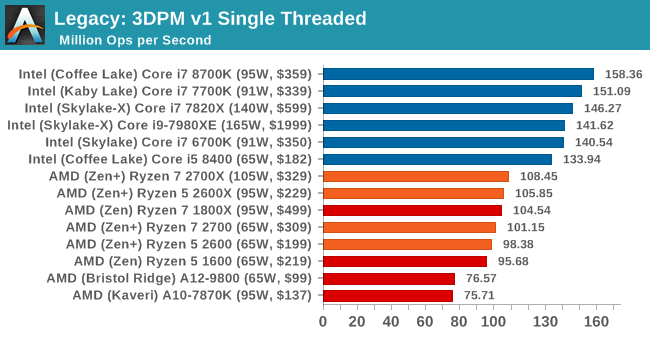
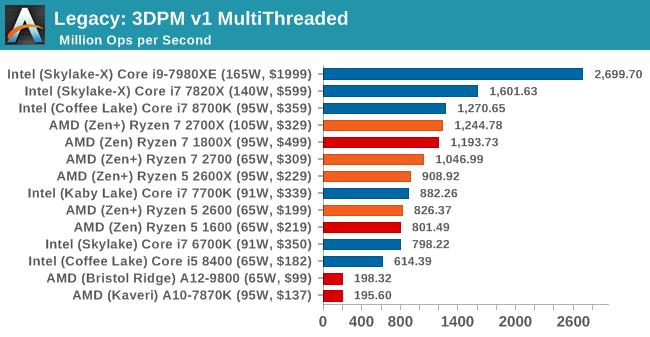
CineBench 11.5 and 10
Cinebench is a widely known benchmarking tool for measuring performance relative to MAXON's animation software Cinema 4D. Cinebench has been optimized over a decade and focuses on purely CPU horsepower, meaning if there is a discrepancy in pure throughput characteristics, Cinebench is likely to show that discrepancy. Arguably other software doesn't make use of all the tools available, so the real world relevance might purely be academic, but given our large database of data for Cinebench it seems difficult to ignore a small five minute test. We run the modern version 15 in this test, as well as the older 11.5 and 10 due to our back data.
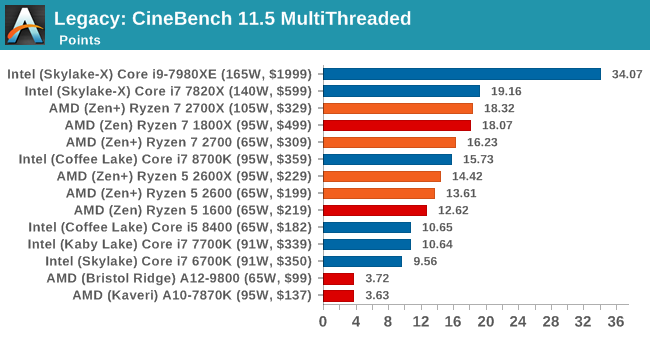
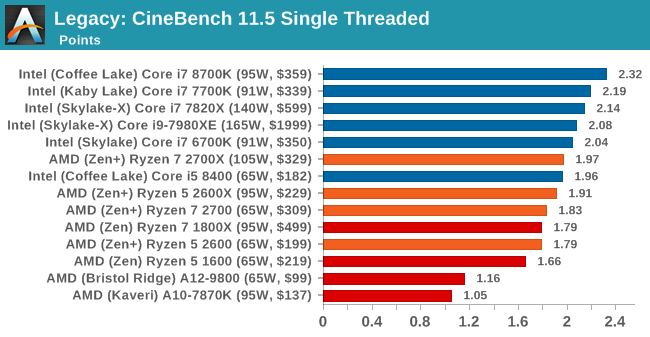

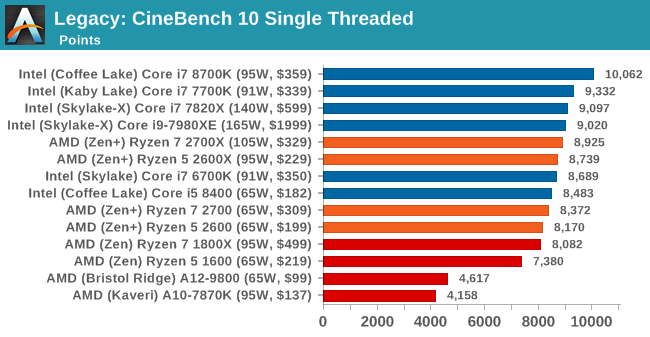
x264 HD 3.0
Similarly, the x264 HD 3.0 package we use here is also kept for historic regressional data. The latest version is 5.0.1, and encodes a 1080p video clip into a high quality x264 file. Version 3.0 only performs the same test on a 720p file, and in most circumstances the software performance hits its limit on high end processors, but still works well for mainstream and low-end. Also, this version only takes a few minutes, whereas the latest can take over 90 minutes to run.
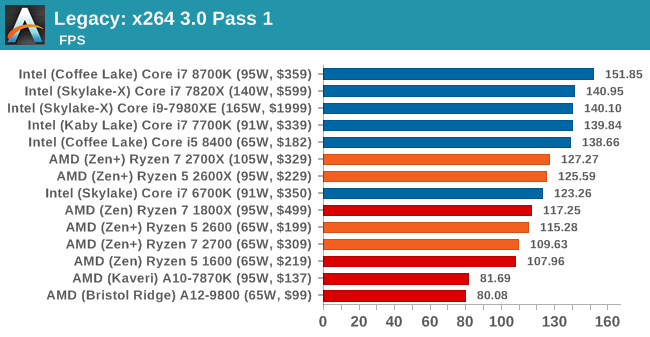
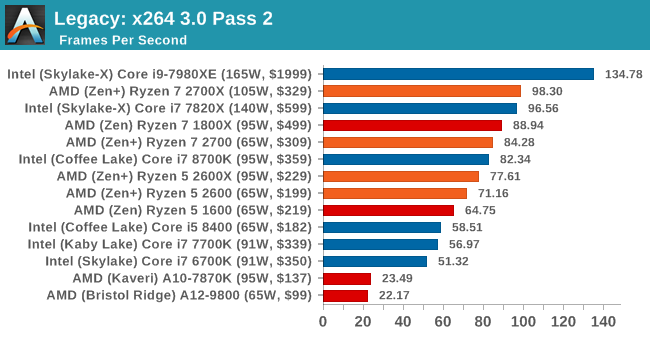










545 Comments
View All Comments
Maxiking - Tuesday, April 24, 2018 - link
"I just finished running Rise of the Tomb Raider benchmarks, 1080p, very high preset, FXAA.Unpatched:
Mountain Peak: 131.48 FPS (min: 81.19 max: 197.02)
Syria: 101.99 FPS (min: 62.73, max: 122.24)
Geothermal Valley: 98.93 FPS (min:76.48, max: 117.00)
Overall score: 111.31 FPS
Windows patch only:
Mountain Peak: 135.34 FPS (min: 38.21 max: 212.84)
Syria: 102.54 FPS (min: 44.22, max: 144.03)
Geothermal Valley: 96.36 FPS (min:41.35, max: 148.46)
Overall score: 111.93 FPS
Windows patch and BIOS update:
Mountain Peak: 134.01 FPS (min: 59.91 max: 216.16)
Syria: 101.68 FPS (min: 38.95, max: 143.44)
Geothermal Valley: 97.55 FPS (min:46.18, max: 143.97)
Overall score: 111.62 FPS
Average framerates don't seem affected."
From the link you posted, you got rekt by yourself.
Ranger1065 - Wednesday, April 25, 2018 - link
Nicely done Mr Aardvark. That made me smile.mikael.skytter - Tuesday, April 24, 2018 - link
Thanks for a great review. Any chance it would be possible to look into how SpeedShift 2 compares to AMD:s solution for short burst loads and clock ramp-up?Thanks!
koekkoe - Tuesday, April 24, 2018 - link
My favorite part in the article: fsfasd.Meow.au - Tuesday, April 24, 2018 - link
I’ve visited the comments section a few times since the publication. As a psychologist in training, I’ve found it interesting as the initial complaints about this review were reasonable (it doesn’t match other sites), but by page 45 are now bordering on paranoia and conspiracy theories. The conspiracy theories are all the more puzzling when the simplest and most reasonable explanation is that the spectre patch has punished Intel processors rather severely. I’ve found trying to argue against conspiracy theories, be it the moon landing or anti-vaxers, to be singularly ineffective.The more you provide scientific evidence and rationality, the harder conspiracy theorists dig in their heels and defend their original position. Our natural confirmatory bias to only seek evidence which confirms pre-existing beliefs seems to be a flaw built into the wiring of the human brain. Psychologically protective? Yes... it’s nice to always be right. Useful for doing science? No.
I’d be delighted (and shocked) in a week’s time to learn of massive incompetence or a cover up. I expect there to be some interesting and unexpected details. But I’m guessing no evidence will be found for the commonly repeated conspiracy theories (spectre effect is minimal, heatsink throttling, bias against intel, etc.). But I guess that will just be further evidence there really is a conspiracy... whatever.
Keep up the good work guys. A long time reader.
RafaelHerschel - Wednesday, April 25, 2018 - link
I think you need more training, psychologist in training, because it seems that you can't detect your own personal bias. As you stated yourself, the original complaints are quite reasonable. The problem is that AnandTech is not addressing these complaints in a timely manner and is mostly interested in damage control.The fact that some complaints are unreasonable doesn't change the fact.
Many other reviewers have applied all relevant patches, it is poor form to assume that they haven't. But I understand why you question their competence or integrity. It's cognitive dissonance. You trust AnandTech. In this case AnandTech is an outlier and has not clarified the unique results of their gaming test. Your trust in AnandTech is therefore not logical, and yet you consider yourself a logical person.
Therefore, you have decided that the 'logical' explanation is that all other reviewers haven't applied the patches... whatever.
divertedpanda - Wednesday, April 25, 2018 - link
Other reviewers admitted having not patched down to the bios since some used mobos where patches were not yet released.TrackSmart - Thursday, April 26, 2018 - link
This comment by RafaelHerschel doesn't make sense. The person being maligned said exactly this: "I expect there to be some interesting and unexpected details. But I’m guessing no evidence will be found for the commonly repeated conspiracy theories..."And he/she was EXACTLY CORRECT in that prediction.
Your complaint, on the other hand, seems disingenuous. Anandtech's staff immediately flagged their gaming results as anomalous (on just about every page of the article). Then they dug deep to figure out what happened, which takes time to test, confirm, and then publish about). Then about 5 days later they posted updated results (2700x and i7-8700k, so far) and a VERY DETAILED explanation of what happened.
So.... What's the problem again? That sometimes unforeseen test parameters can lead to different results? That can happen. The only question is how was the situation handled. In this case, I think reasonably well under the circumstances.
mapesdhs - Monday, May 14, 2018 - link
Grud knows now what "timely manner" is supposed to mean these days. Perhaps RafaelHerschel would only be happy if AT can go back in time and change the article before it's published.Meow.au, re what you said, Stefan Molyneux has some great pieces on these issues on YT.
schlock - Tuesday, April 24, 2018 - link
Why aren't we running DDR4-3200 across all systems? It may go a small ways to explaining the small discrepancy in intel performance ...